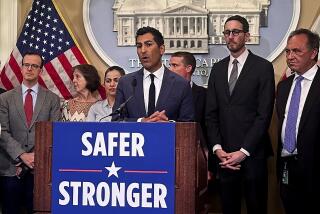Panels Clear Ban on Sale of Witness Stories : Legislature: Pretrial publicity in Simpson case led to the effort, which would make it illegal to sell information about crimes before or during trials.
- Share via
SACRAMENTO — Citing massive pretrial publicity in the O.J. Simpson murder case, legislative committees Tuesday approved a pair of bills that would make it against the law for a witness to sell information about a crime either before or during a trial.
Assembly Speaker Willie Brown (D-San Francisco) said the measures would not apply to anyone involved in the Simpson case, unless the sale of a witness’ story occurred after Jan. 1, when the bill would become law.
Brown argued that the payment of money to witnesses by sensationalistic tabloid newspapers and television programs damages the constitutional right to a fair trial by compounding pretrial publicity and creating an “incentive to lie.”
Under the legislation, virtually identical versions of which were approved unanimously by both the Assembly Public Safety and the Senate Judiciary committees, witnesses and potential witnesses to criminal acts would be prohibited from selling their information until a trial is complete.
Brown told the Judiciary Committee that his bill allows a witness to “tell the story. You just cannot be paid for it because that taints the perception of truth.”
Witnesses who knowingly violated the prohibition would be subject to a six-month term in jail or a fine of up to three times the amount of the compensation they accepted, or both.
The Brown measure and a similar proposal by Sen. Quentin L. Kopp (I-San Francisco) were introduced in the wake of controversy regarding extensive publicity in the Simpson murder case in Los Angeles.
Kopp cited the example of a potentially important prosecution witness, Jill Shively, whom prosecutors decided not to call to testify before a grand jury. He noted Shively had received $5,000 from the “Hard Copy” television program for her account that placed Simpson near the scene of the murder of his ex-wife and her friend at about the time the slayings occurred.
Brown, whose bill was supported by a representative of Los Angeles Dist. Atty. Gil Garcetti and syndicated legal columnist Bruce Fein, said his measure was “narrowly drawn” to avoid infringing on the constitutional right to free speech and free press.
However, it drew opposition from representatives of the California Newspaper Publishers Assn. and the California Broadcasters Assn., among others.
Vic Biondi of the broadcasters organization and Tom Newton, representing the publishers, voiced fears that news reporters who witnessed a crime while performing their jobs could be subject to criminal sanctions of the bill.
But Brown assured the committee that news reporters were exempt from the bill and amended it to also exclude independent free-lancers and stringers who sell stories to news organizations.
Both bills now go for hearings in fiscal committees.
More to Read
Get the L.A. Times Politics newsletter
Deeply reported insights into legislation, politics and policy from Sacramento, Washington and beyond. In your inbox twice per week.
You may occasionally receive promotional content from the Los Angeles Times.










